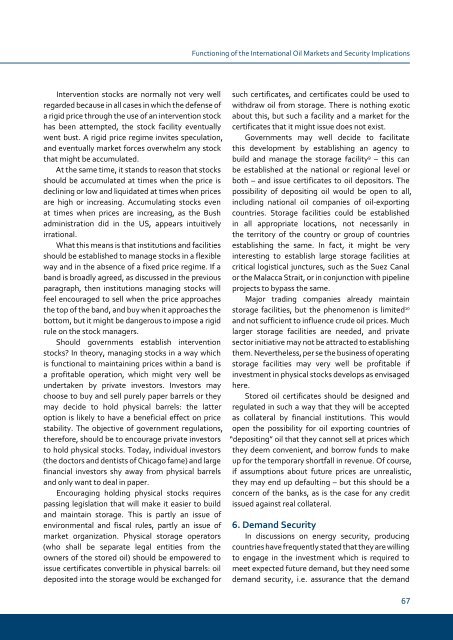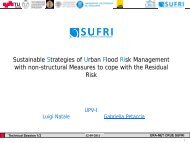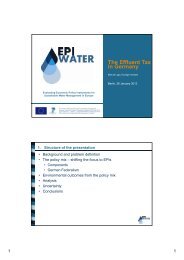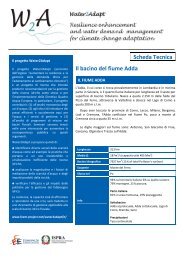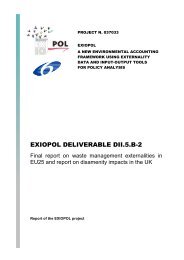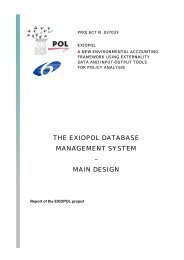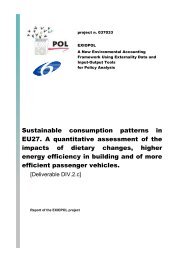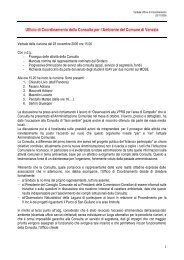Gulf and European Energy Supply Security - Feem-project.net
Gulf and European Energy Supply Security - Feem-project.net
Gulf and European Energy Supply Security - Feem-project.net
You also want an ePaper? Increase the reach of your titles
YUMPU automatically turns print PDFs into web optimized ePapers that Google loves.
Intervention stocks are normally not very well<br />
regarded because in all cases in which the defense of<br />
a rigid price through the use of an intervention stock<br />
has been attempted, the stock facility eventually<br />
went bust. A rigid price regime invites speculation,<br />
<strong>and</strong> eventually market forces overwhelm any stock<br />
that might be accumulated.<br />
At the same time, it st<strong>and</strong>s to reason that stocks<br />
should be accumulated at times when the price is<br />
declining or low <strong>and</strong> liquidated at times when prices<br />
are high or increasing. Accumulating stocks even<br />
at times when prices are increasing, as the Bush<br />
administration did in the US, appears intuitively<br />
irrational.<br />
What this means is that institutions <strong>and</strong> facilities<br />
should be established to manage stocks in a flexible<br />
way <strong>and</strong> in the absence of a fixed price regime. If a<br />
b<strong>and</strong> is broadly agreed, as discussed in the previous<br />
paragraph, then institutions managing stocks will<br />
feel encouraged to sell when the price approaches<br />
the top of the b<strong>and</strong>, <strong>and</strong> buy when it approaches the<br />
bottom, but it might be dangerous to impose a rigid<br />
rule on the stock managers.<br />
Should governments establish intervention<br />
stocks? In theory, managing stocks in a way which<br />
is functional to maintaining prices within a b<strong>and</strong> is<br />
a profitable operation, which might very well be<br />
undertaken by private investors. Investors may<br />
choose to buy <strong>and</strong> sell purely paper barrels or they<br />
may decide to hold physical barrels: the latter<br />
option is likely to have a beneficial effect on price<br />
stability. The objective of government regulations,<br />
therefore, should be to encourage private investors<br />
to hold physical stocks. Today, individual investors<br />
(the doctors <strong>and</strong> dentists of Chicago fame) <strong>and</strong> large<br />
financial investors shy away from physical barrels<br />
<strong>and</strong> only want to deal in paper.<br />
Encouraging holding physical stocks requires<br />
passing legislation that will make it easier to build<br />
<strong>and</strong> maintain storage. This is partly an issue of<br />
environmental <strong>and</strong> fiscal rules, partly an issue of<br />
market organization. Physical storage operators<br />
(who shall be separate legal entities from the<br />
owners of the stored oil) should be empowered to<br />
issue certificates convertible in physical barrels: oil<br />
deposited into the storage would be exchanged for<br />
Functioning of the International Oil Markets <strong>and</strong> <strong>Security</strong> Implications<br />
such certificates, <strong>and</strong> certificates could be used to<br />
withdraw oil from storage. There is nothing exotic<br />
about this, but such a facility <strong>and</strong> a market for the<br />
certificates that it might issue does not exist.<br />
Governments may well decide to facilitate<br />
this development by establishing an agency to<br />
build <strong>and</strong> manage the storage facility 9 – this can<br />
be established at the national or regional level or<br />
both – <strong>and</strong> issue certificates to oil depositors. The<br />
possibility of depositing oil would be open to all,<br />
including national oil companies of oil-exporting<br />
countries. Storage facilities could be established<br />
in all appropriate locations, not necessarily in<br />
the territory of the country or group of countries<br />
establishing the same. In fact, it might be very<br />
interesting to establish large storage facilities at<br />
critical logistical junctures, such as the Suez Canal<br />
or the Malacca Strait, or in conjunction with pipeline<br />
<strong>project</strong>s to bypass the same.<br />
Major trading companies already maintain<br />
storage facilities, but the phenomenon is limited 10<br />
<strong>and</strong> not sufficient to influence crude oil prices. Much<br />
larger storage facilities are needed, <strong>and</strong> private<br />
sector initiative may not be attracted to establishing<br />
them. Nevertheless, per se the business of operating<br />
storage facilities may very well be profitable if<br />
investment in physical stocks develops as envisaged<br />
here.<br />
Stored oil certificates should be designed <strong>and</strong><br />
regulated in such a way that they will be accepted<br />
as collateral by financial institutions. This would<br />
open the possibility for oil exporting countries of<br />
“depositing” oil that they cannot sell at prices which<br />
they deem convenient, <strong>and</strong> borrow funds to make<br />
up for the temporary shortfall in revenue. Of course,<br />
if assumptions about future prices are unrealistic,<br />
they may end up defaulting – but this should be a<br />
concern of the banks, as is the case for any credit<br />
issued against real collateral.<br />
6. Dem<strong>and</strong> security<br />
In discussions on energy security, producing<br />
countries have frequently stated that they are willing<br />
to engage in the investment which is required to<br />
meet expected future dem<strong>and</strong>, but they need some<br />
dem<strong>and</strong> security, i.e. assurance that the dem<strong>and</strong>


